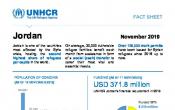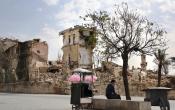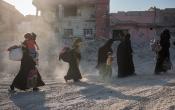Jordan
Operation: Jordan
Location
{"longitude":36,"latitude":31,"zoom_level":7,"iso_codes":"'JOR'"}
By clicking on the icons on the map, additional information is displayed.
The boundaries and names shown and the designations used on this map do not imply official endorsement or acceptance by the United Nations.
Key Figures
| 2019 year-end results | |
| 81,600 | people of concern received legal advice or assistance, with 4,200 interventions by UNHCR related to detention |
| 32,500 | households received monthly cash grants |
| 28,500 | refugees were referred to secondary and tertiary health care, including obstetric emergencies. |
| 6,800 | best interests assessments were conducted for children-at-risk |
| 1,700 | survivors of sexual and gender-based violence (SGBV) received psychosocial counselling |
| 2020 planning figures | |
| 50,000 | people of concern receive legal assistance |
| 38,700 | households gain monthly, multi-purpose cash grants |
| 36,000 | people of concern are referred to secondary and tertiary medical care |
| 5,800 | refugee children benefit from best interests determinations |
| 1,600 | survivors of sexual and gender-based violence access psychological and social counselling |
Latest Updates and Related Links
People of Concern
3%
Decrease in
2019
2019
| 2019 | 747,116 |
| 2018 | 769,260 |
| 2017 | 734,841 |

[["Refugees",693684],["Asylum-seekers",51305],["Others of concern",2127]]
Loading ...
Jordan
< Back
2019
{"categories":[2015,2016,2017,2018,2019,2020],"budget":[328.87751632,318.80353781,277.212605641,274.89660650999997,371.91846122000004,426.73744859],"expenditure":[208.74308994,218.32880034000002,238.50705437,224.59320141999999,213.88049035,null]}
{"categories":[2015,2016,2017,2018,2019,2020],"p1":[328.87751632,318.80353781,277.212605641,274.89660650999997,371.91846122000004,426.73744859],"p2":[null,null,null,null,null,null],"p3":[null,null,null,null,null,null],"p4":[null,null,null,null,null,null]}
{"categories":[2015,2016,2017,2018,2019,2020],"p1":[208.74308994,218.32880034000002,238.50705437,224.59320141999999,213.88049035,null],"p2":[null,null,null,null,null,null],"p3":[null,null,null,null,null,null],"p4":[null,null,null,null,null,null]}
Loading ...
CHOOSE A YEAR
- 2014
- 2015
- 2016
- 2017
- 2018
- 2019
- 2020
Operational context
Throughout 2019, the Government of Jordan consistently highlighted the impact of hosting refugees on the country’s infrastructure and economy and reiterated the need for more responsibility and burden-sharing by the international community (as well as during the Global Refugee Forum in December 2019).As the Syria crisis approached its tenth year, prospects for solutions remained generally limited. Since the border crossing to the Syrian Arab Republic (Syria) re-opened in 2018, over 36,000 refugees registered with UNHCR returned to Syria - 30,000 in 2019 alone.
Effective April 2019, the Government announced the roll back of the 2018 regulation which raised the fees for Syrians to access health care, however non-Syrians were still obliged to pay foreigners’ rates, making access to public health facilities challenging.
Ongoing strong collaboration with the Ministry of Labour ensured continued access to work permits for both urban and camp-based refugees, offering refugees formal employment opportunities and a sustainable path towards self-reliance.
Population trends
As of 31 December 2019, Jordan hosted some 747,000 people of concern to UNHCR. Syrian refugees remained the largest refugee group accounting for nearly 654,700 people, a slight decrease compared to 2018. Some 22,300 individuals were registered in 2019 (the majority births). Over 80% of Syrian refugees resided in urban areas, while around 19% resided in camps. Over 90,500 refugees of more than 50 nationalities other than Syrian also lived exclusively in urban areas, mostly Iraqis.Among almost 5,500 resettlement departures in 2019, some 4,840 were refugees from Syria. Overall resettlement needs were estimated at 72,080 individuals with almost 5,580 refugees also submitted to 16 resettlement countries during the year.
Achievements
- Winter cash support was provided to refugees of all nationalities, reaching 93,000 households in camps and urban areas.
- Through a UNHCR-supported urban verification exercise, the Ministry of Interior continued to issue service cards to all Syrian nationals residing in Jordan in urban areas and camps, with UNHCR providing delivery for Syrians registered with UNHCR. During the year, 11,100 service cards were issued, bringing the total to nearly 488,500.
- A cumulative total of 176,900 work permits had been issued to Syrian refugees by the end of 2019, around 5% to women. The extension of access to work permits to refugees in Zaatari and Azraq camps (21% of all work permits) resulted in increased mobility and opportunity for these families.
Unmet needs
- Health programmes could not be expanded to cover actual needs from the beginning of the year due to funding limitations. Medical referrals for non-Syrians covered only the most urgent cases
- Large gaps remained around infrastructure in camps, particularly shelter maintenance, equitable access to energy and road maintenance.
- Lack of budget also affected key areas such as access to education, child protection and SGBV response for all refugees, with limitations for non-Syrians particularly acute.
Operational Environment
While Jordan is not a signatory to the 1951 Refugee Convention, a Memorandum of Understanding establishes the parameters for cooperation between UNHCR and the Government of Jordan. Protection space for refugees continues to decrease as entry into the territory is severely restricted.In order to respond to the needs of refugees in Jordan, an increase in humanitarian assistance will be required. In 2019, UNHCR will continue to coordinate the refugee response, in collaboration with the Government of Jordan. UNHCR will maintain the coordination of the refugee pillar of the inter-agency appeal through the Regional Refugee and Resilience Plan (3RP). The United Nations Country Team has signed the United Nations Partnership Framework for the Sustainable Development Goal 2018-2022, where one refugee specific outcome has been included.
Over 80 per cent of refugees live outside camps and many have entered a cycle of asset depletion, with savings exhausted and levels of debt increasing. The Vulnerability Assessment Framework found that over 85 per cent of Syrian refugee households live under the Jordanian poverty line of USD 96 per person/month.
While access to legal employment for Syrian refugees has improved with some positive initiatives by the Government in relation to work permits, more is required in order to facilitate access to employment. UNHCR will continue to support refugee livelihoods and the right to work through advocacy, coordination and limited investments.
Overall, in 2019 UNHCR’s interventions in Jordan will focus on protection, cash assistance, livelihoods, health care, camp management and community mobilization. Vulnerability-based targeting for cash and other assistance will be strengthened. For the urban refugees, UNHCR’s multi-purpose cash assistance strategy will be a key component of UNHCR's comprehensive protection response aiming at decreasing economic and social vulnerabilities and reducing multi-dimensional poverty, in addition to income poverty. The operation will continue the nationalization process of partnerships.
The number of Iraqis, Sudanese, Somalis and Yemenis registering with UNHCR is expected to continue growing in 2019. UNHCR, in line with the views expressed by refugees in age, gender and diversity mainstreaming (AGDM) exercises, will continue efforts in implementing its “One Refugee” policy for all refugee groups under its protection, Syrian and non-Syrian alike, seeking to align protection and assistance policies with regard to various nationalities.
UNHCR will continue to monitor the situation in regards to returns, including ongoing preparedness measures.
Key priorities
In 2019, UNHCR will focus on:- Advocating on access to territory, the right to seek asylum, the principles of non-refoulement, family unity, and access to livelihood opportunities;
- Supporting the Government to provide security and protection to people of concern in accordance with international refugee protection principles through capacity-building initiatives;
- Providing multi-sectoral assistance to refugees in camps and cash assistance for up to vulnerable 38,000 families living in urban areas.





















